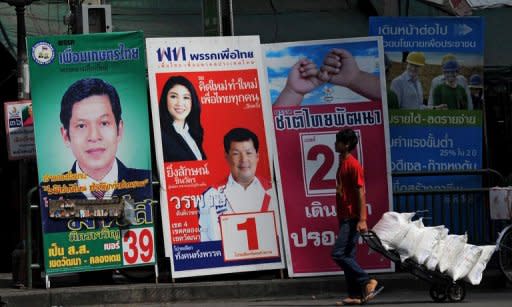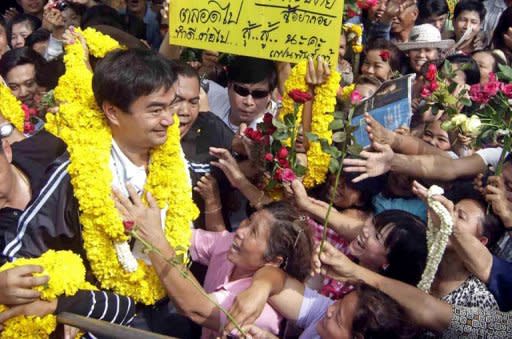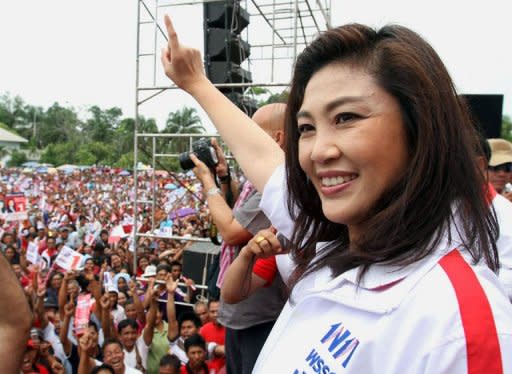US nervous ahead of Thai election
The United States is nervously watching Sunday's election in Thailand, with policymakers worried it may set off new instability that diminishes the role of Washington's oldest Asian ally. President Barack Obama's administration has made Southeast Asia a priority but has focused on building ties with Indonesia and former war foe Vietnam amid concern that Thailand is too absorbed in internal strife. US officials are hoping Thailand's election will proceed smoothly and pave the way for reconciliation, but some fear for the worst -- particularly as the campaign has been dominated by divisive former premier Thaksin Shinawatra. Kurt Campbell, the assistant secretary of state for East Asian affairs, said in May that the United States wanted "very much to work more closely" with Thailand and that the election period would be "decisive" in setting the course of relations. The United States has since reached out to both sides to encourage calm, with a US envoy meeting recently with opposition leader Yingluck Shinawatra -- the sister of Thaksin, who was deposed in a 2006 coup and now lives in exile. But the United States has been careful not to interject itself directly in the election. Prime Minister Abhisit Vejjajiva's government protested last year when Campbell met members of the "Red Shirts" waging major street protests. Foreign policy has not played a major role in the election. Most observers believe both the opposition, which enjoys support in rural areas, and Abhisit's establishment-backed Democrats want warm ties with the United States. Thailand is one of Washington's oldest allies, famously offering elephants to President Abraham Lincoln to wage the Civil War. Thaksin closely assisted former US president George W. Bush in his global "war on terrorism." "Thailand is friendly to the West -- and to pretty much everyone. But since the 2006 coup, Thai-US relations have been stuck in neutral and this has given an opportunity for Indonesia, Vietnam and others to step up to the plate," said Timothy Hamlin, a research analyst at the Stimson Center. Hamlin said much of Thai diplomacy now consisted of explaining its complex domestic situation to an overseas audience. "I think the ideal outcome from a foreign policy perspective would be peaceful elections, whichever party is a legitimate victor forms a government, and the foreign ministry can actually go back to normal diplomacy," he said. But the outcome may not be so smooth -- and it remains to be seen how the United States would react if there were another intervention by the military, which sees itself as the guardian of the revered but ill king. The United States suspended some $24 million in defense aid to Thailand after the 2006 coup, in line with US law that restricts aid to militaries that topple democratic governments. Washington resumed the assistance in early 2008. The US response drew mixed views. Some friends of Thailand -- notably Congressman Eni Faleomavaega -- accused Washington of needlessly alienating a trusted ally, while many policymakers saw the aid cutoff as largely symbolic. Joshua Kurlantzick, a fellow at the Council on Foreign Relations, expected a tougher response if the Thai military attempted a new coup. "It's just so anachronistic. This is not the Cold War; it's 2011. No middle-income emerging democracy has a coup," he said. In a circular effect, the rise of other Southeast Asian nations lowered Thailand's strategic importance and made it easier for the United States to criticize developments in Bangkok, according to the analyst. "Thailand has started to be grouped with states like Vietnam, while in the past it was grouped with fellow democracies in terms of how people are viewing them," he said. Thailand has been seeking to address foreign concerns, with Abhisit last year deploying Thai forces as UN peacekeepers in Sudan. Thailand also benefits from a broadly positive image among the US public. But conflict involving Thailand has also remained upfront. Street clashes last year between troops and Red Shirt protesters left 90 people dead, while at least 28 people died this year in border fighting with Cambodia.




